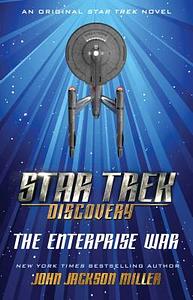Take a photo of a barcode or cover
When I finished this book, I wanted to go on another adventure with this crew. Miller did a great job with character and plot development. He seamlessly filled the gap between Discovery seasons 1 & 2.
I genuinely felt like the Pike in this book is the same we meet in Discovery.
I genuinely felt like the Pike in this book is the same we meet in Discovery.
adventurous
emotional
funny
tense
medium-paced
Plot or Character Driven:
A mix
Strong character development:
Yes
Loveable characters:
Yes
Diverse cast of characters:
No
Flaws of characters a main focus:
No
Gripping from the jump, paced just like the best episodes of Star Trek, and a twist I didn’t see coming that subverts your expectations but is Trek to the core.
This was a book where I liked the characters and ideas, especially in the final part. It was just the Robinson Crusoe bits with the ship separated where the story started to drag for me.
Captain Pike, cool aliens ... how can it go wrong? This was a satisfying read.
I was so disappointed at the lacklustre and thoroughly unimaginative Drastic Measures by Dayton Ward (Desperate Hours by David Mack was just on the right side of ‘meh’ as well, to be honest) that I thought I’d never read a Discovery novel again.
(Having said that, the lowest bar ever for a tie-in series has to be the three Star Wars novels penned by Chuck Wendig, which managed the impossible feat of having no plot, and being as boring as a Jar Jar Binks talk show at the same time.)
But I digress. What intrigued me about The Enterprise War is that it genuinely seems to plug a gap between seasons one and two of Star Trek Discovery: What the heck happened to the Enterprise during the Battle of the Binary Stars?
John Jackson Miller’s concept of the Boundless is probably one of my favourite alien entities in any incarnation of Star Trek to date. The author has great fun with the fact that, as a warrior race, they come across as gormless and dim-witted Klingons … and then he redeems them at the end in a truly wonderful example of Spielbergian transcendence.
The characterisation here is spot-on: Pike is, well, Pike. This is a very funny book, with lots of banter between the large cast. JJM has clearly earned his stripes as a Star Trek fan, and does not overwhelm his narrative with excessive geekiness. There is a wonderful knowingness and edge to the writing.
I think the great thing about Discovery the television show is that it has freed Star Trek from the stifling confines of Roddenberry’s fishbowl prescriptiveness (hence Tilly’s f-bomb, the first gay couple, etc.)
JJM captures this spirit with The Enterprise War, with a lot of debate about why the Enterprise is so heavily weaponised for a science vessel. And why there are no stepladders onboard to reach the upper bulkheads when the artificial gravity fails.
(Having said that, the lowest bar ever for a tie-in series has to be the three Star Wars novels penned by Chuck Wendig, which managed the impossible feat of having no plot, and being as boring as a Jar Jar Binks talk show at the same time.)
But I digress. What intrigued me about The Enterprise War is that it genuinely seems to plug a gap between seasons one and two of Star Trek Discovery: What the heck happened to the Enterprise during the Battle of the Binary Stars?
John Jackson Miller’s concept of the Boundless is probably one of my favourite alien entities in any incarnation of Star Trek to date. The author has great fun with the fact that, as a warrior race, they come across as gormless and dim-witted Klingons … and then he redeems them at the end in a truly wonderful example of Spielbergian transcendence.
The characterisation here is spot-on: Pike is, well, Pike. This is a very funny book, with lots of banter between the large cast. JJM has clearly earned his stripes as a Star Trek fan, and does not overwhelm his narrative with excessive geekiness. There is a wonderful knowingness and edge to the writing.
I think the great thing about Discovery the television show is that it has freed Star Trek from the stifling confines of Roddenberry’s fishbowl prescriptiveness (hence Tilly’s f-bomb, the first gay couple, etc.)
JJM captures this spirit with The Enterprise War, with a lot of debate about why the Enterprise is so heavily weaponised for a science vessel. And why there are no stepladders onboard to reach the upper bulkheads when the artificial gravity fails.
adventurous
funny
mysterious
tense
medium-paced
Diverse cast of characters:
Yes
Flaws of characters a main focus:
Yes


